Smoke rises in Khartoum, Sudan as paramilitary group battles army
Smoke rose in Khartoum, Sudan, Saturday as a paramilitary group said it had seized the presidential palace. (Reuters)
JOHANNESBURG - Questions are being asked after a U.S. diplomatic convoy came under fire in the East African capital Khartoum in Sudan, where ongoing fighting in the streets and in the air over the city between government and paramilitary forces has led so far to close to more than 200 deaths, according to the U.N.
All in the convoy were safe, but observers are asking why vehicles left the embassy compound, when the U.S. Mission to Sudan has issued a security alert advising U.S. citizens to "attempt to keep away from roadways", and further with the international airport being closed, with 14 aircraft said to be destroyed, evacuation was not being considered at that time.
The convoy was clearly marked as being American, and was flying U.S. flags, according to Secretary of State Anthony Blinken, who told reporters Tuesday at the G7 Foreign Ministers’ Summit that he had phoned the two leaders of the forces involved in the conflict to demand a ceasefire and expressed "grave concern" about civilian deaths. Tuesday, a ceasefire was said to be agreed upon, but explosions and gunfire across Khartoum demonstrated it was not holding.
Once again, it appears that the U.S. is losing out in the battle for influence in Africa to Russia. Shadowy mercenaries from Russia’s Wagner group have reportedly not been attacked as they drive around Khartoum.
US DIPLOMATIC CONVOY ATTACKED IN SUDAN AS RIVAL FACTIONS BATTLE IN CAPITAL
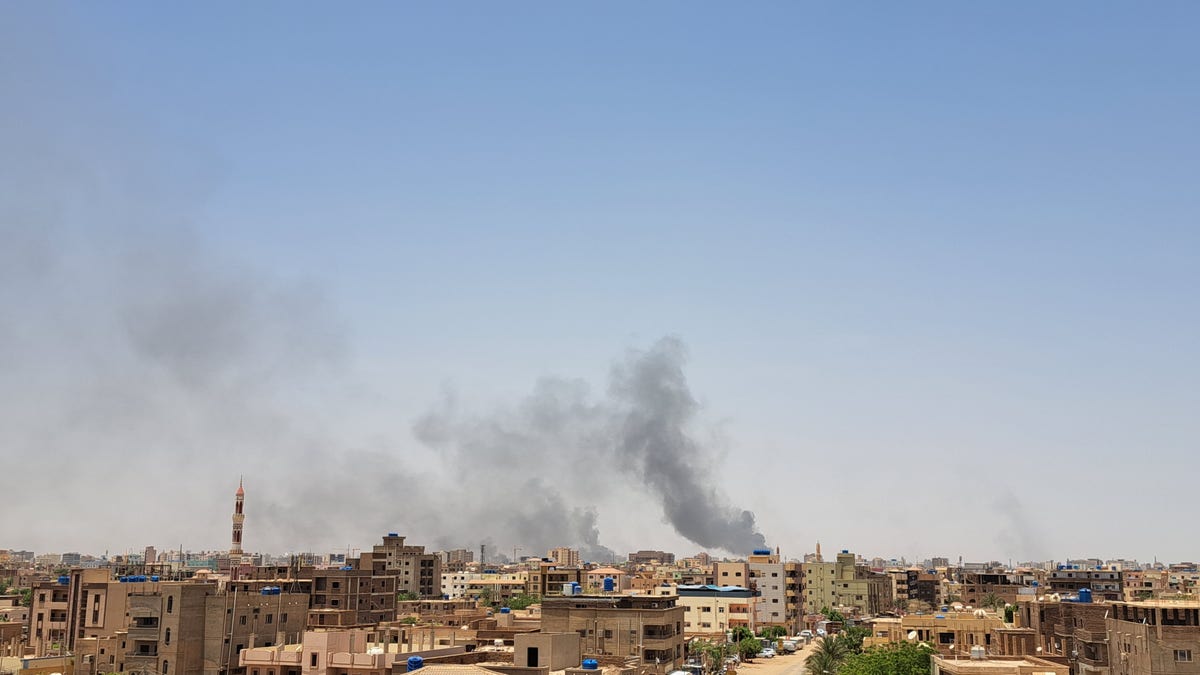
Smokes rise after clashes erupted in the Sudanese capital of Khartoum on April 15, 2023 between the Sudanese Armed Forces and the paramilitary Rapid Support Forces. (Photo by Stringer/Anadolu Agency via Getty Images)
The Kremlin’s Foreign Minister Sergey Lavrov also had no problems when he arrived in the city just two months ago. He was there to put ink to a deal which will see Russia’s first fully-fledged African navy base open in Port Sudan. When asked about the huge presence in Sudan of Russians from the Wagner Group, Lavrov defended them, saying they worked "primarily in the field of developing the mineral resource base," and adding, "We appreciate the attention that the Sudanese leadership pays to them.″
The Russians then are not coming. They are here, reportedly dealing with both sides in the Sudanese conflict in gold, wheat – and arms. Many of the guns shattering the streets are Russian-made, as are the military jets flying low level over the city.
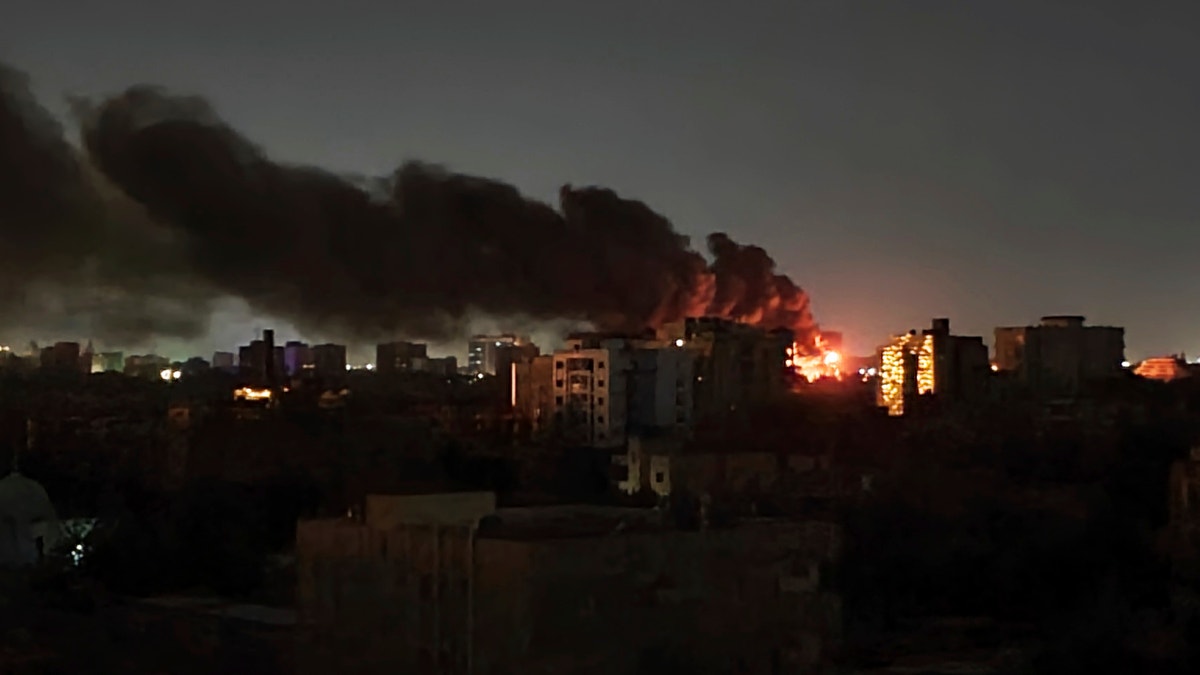
Smoke rises over the horizon as a fire burns after a strike in Khartoum, Sudan, Sunday, April 16, 2023. Washington's top diplomat said Tuesday, April 18, 2023, that a U.S. Embassy convoy came under fire in Sudan and denounced "indiscriminate military operations" as the country's armed forces and a powerful rival unleashed heavy weapons in urban areas for a fourth day. (AP Photo/Abdullah Moneim)
As an indication of how chaotic it is in Khartoum, a clearly unnerved newsreader on State TV gamely continued reading from the government-approved teleprompter script, saying "everything is calm", while gunfire was clearly audible from within the broadcaster’s compound.
The two rival generals whose troops are now fighting each other used to work together, combining to oust veteran President Omar al-Bashir in 2019. On the one side, General Abdel Fattah al Burhan, commander of the Sudanese Armed Forces, and on the other General Mohamed Hamdan Dagalo, commander of the Rapid Support Forces (RSF), former mercenaries accused of genocide in Darfur, Sudan. Shots broke out over RSF concerns about whether they would lose influence if they are incorporated into the Sudanese Army – and how such a move might affect their leader Dagalo’s alleged income from the country’s gold mines.
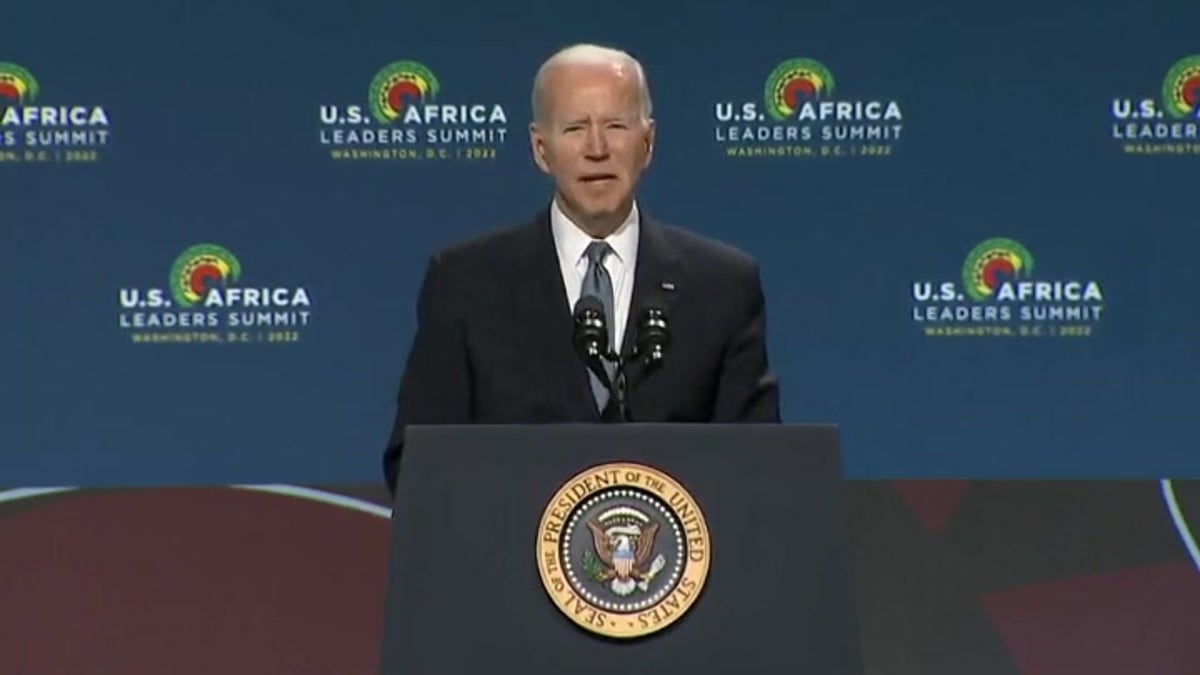
President Biden speaks at the U.S.-Africa Leaders Summit.
RUSSIA AND US JOCKEY FOR SUPPORT ACROSS AFRICA
Sudan is not yet fully exploiting its mineral resources, but is already the 10th largest gold producer in the world, according to mining company Pan African Resources.
The Wagner group regularly fly Antonov cargo planes between Sudan and the Central African Republic – carrying gold out of the country, and bringing in arms. This is according to a November 2022 report by the Organized Crime and Corruption Reporting Project.
The report and other sources, claim both Sudanese military factions are pocketing gold in handsome amounts. However, the big winner here is allegedly the Kremlin and Wagner. The group is said to actually run several gold mining operations, including the major Meroe mine. One source claims Wagner’s gold operations in Sudan is helping to finance Russia’s war effort in Ukraine.
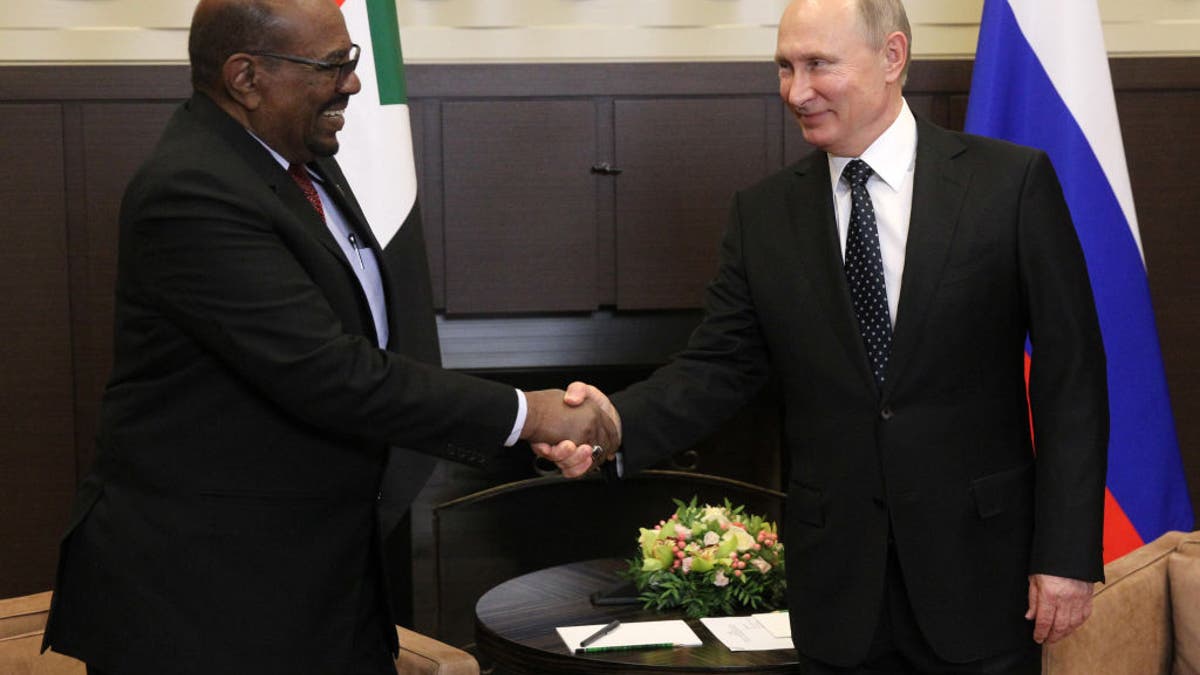
Russian President Vladimir Putin, right, greets former Sudanese President Omar al-Bashir during their meeting at Black Sea resort on Nov., 23, 2017 in Sochi, Russia. President al-Bashir was on his first state visit to Russia. Bashir was ousted in 2019. (Photo by Mikhail Svetlov/Getty Images)
It is good business, as both generals need weapons, "Russia is probably a principal beneficiary of the current fighting and instability," Cameron Hudson, told Fox News Digital. Hudson is formerly a CIA officer and Director of African Affairs at the National Security Council for the George W. Bush administration, and now senior associate with the Center for Strategic and International Studies’ Africa Program.
"As Sudan’s generals become more isolated internationally they will look increasingly toward Russia to break that isolation, and to supply them with the weapons they need to continue fighting," added Hudson.
BLINKEN FLIES INTO 'SUPERPOWER' BATTLEGROUND IN AFRICA
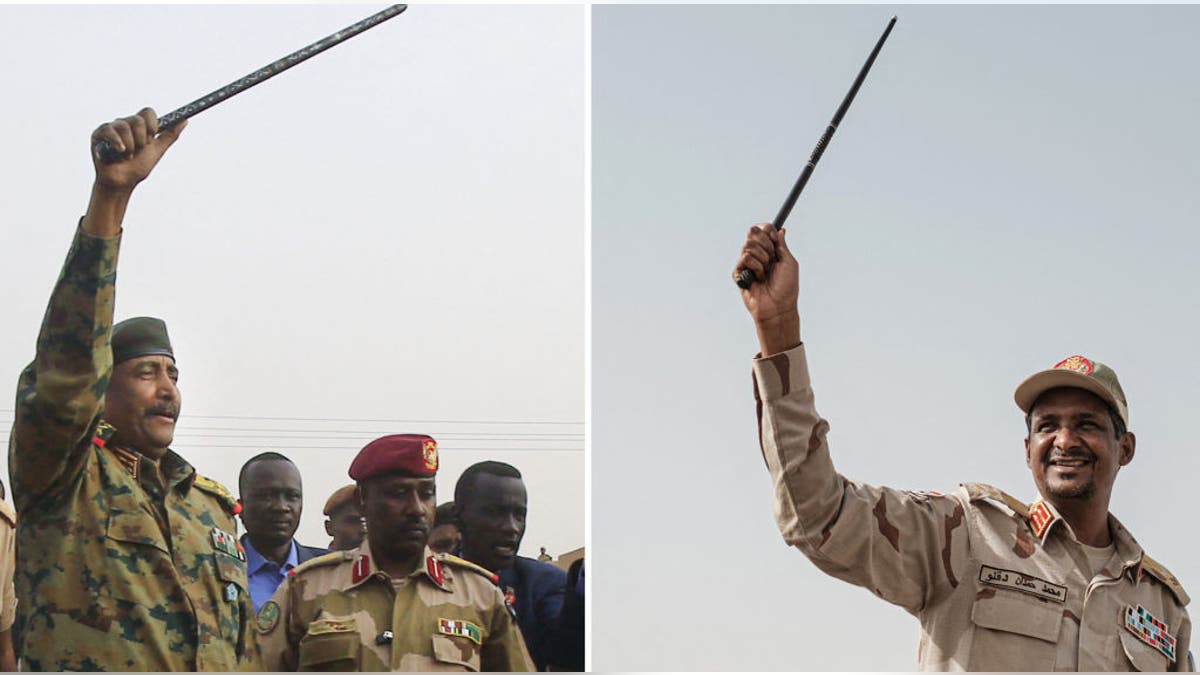
This file picture composite shows General Abdel Fattah al-Burhan, left, the head of Sudan's ruling military council, greeting his supporters in Khartoum's twin city of Omdurman on June 29, 2019. Sudanese paramilitary commander Mohamed Hamdan Daglo, left, raises up a cane during a meeting with his supporters in Khartoum on June 18, 2019. Sixteen months since Sudan's top generals ousted a transition to civilian rule, the coup leaders are embroiled in a dangerous power struggle with deepening rivalries within the security forces, analysts warned on April 16, 2023. (Photo by Yasuyoshi CHIBA and Ashraf SHAZLY / AFP)
Gold could actually be one of the main reasons for this new conflict. "There have been reports of the RSF’s links to gold mining sites in parts of the country," Dr. Andrews Atta-Asamoah, Program Head of the Africa Peace and Security Governance Program at the Institute for Security Studies, told Fox News Digital from Addis Ababa.
"It can be argued that the extent to which the integration of the RSF into the army will affect the power and resource base of the RSF could be linked to their leader’s hesitation to integrate into the army," he added.
So, simply put, the current Washington administration is making phone calls, offers and threats, while the Kremlin is grabbing the gold and supplying arms to Sudan.
"The Biden Administration seems to be operating under the mistaken belief that groups of military leaders and mercenaries, currently setting the country ablaze to protect their own interests, will somehow respond to the financial incentives of development and debt relief despite the fact that they have no history of responding to incentives in the past," the CSIS’s Hudson says.
Hudson added, "The U.S. is currently trying to work through diplomatic allies of the warring factions in Sudan, to increase pressure on them to agree to a ceasefire. But even if successful, there is little reason to believe that the warring generals will agree to allow their differences to be mediated or to allow themselves to be ruled by civilian leaders. What is likely in the near term is that fighting will continue, and the country will become split in two, with areas under military control and other areas under paramilitary control. However, the likelihood of a speedy return to civilian rule, our ultimate objective, seems to be on an indefinite delay."
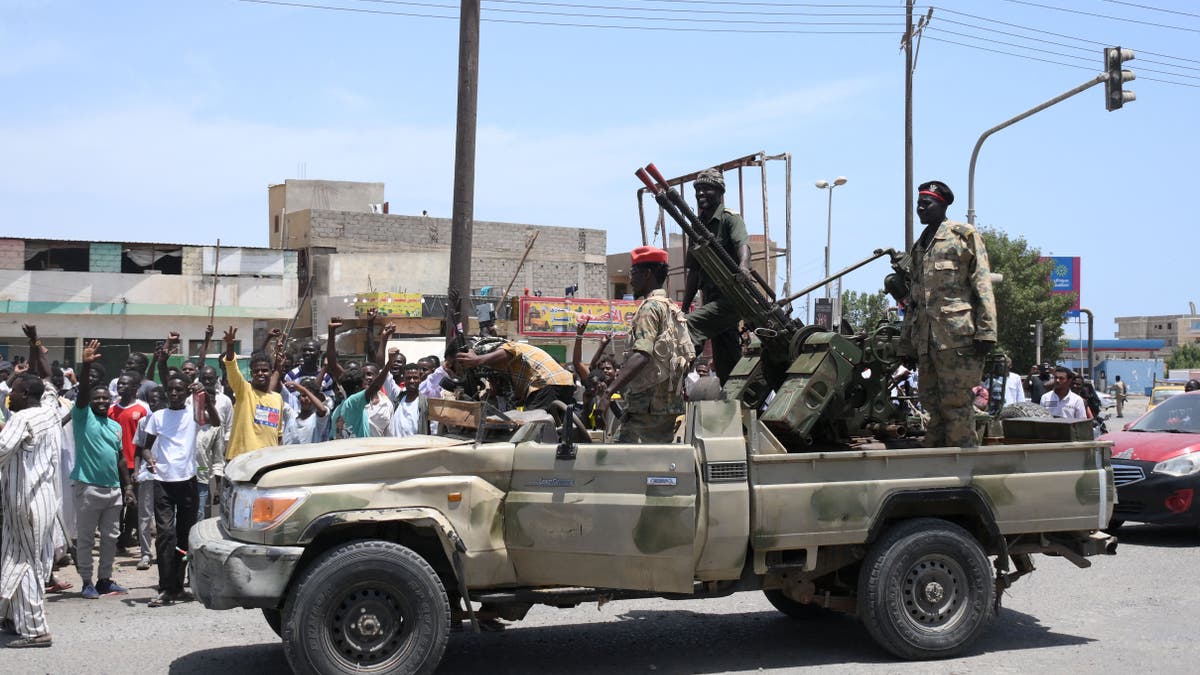
Sudanese greet army soldiers, loyal to army chief Abdel Fattah al-Burhan, in the Red Sea city of Port Sudan on April 16, 2023. Battling fighters in Sudan said they had agreed to an hours-long humanitarian pause, including to evacuate wounded, on the second day of raging urban battles that killed more than 50 civilians including three U.N. staff and sparking international outcry. (Photo by AFP)
CLICK HERE TO GET THE FOX NEWS APP
A State Department spokesperson told Fox News Digital that "The United States condemns in the strongest terms violence between the Sudanese Armed Forces (SAF) and the Rapid Support Forces (RSF). The ongoing fighting between the SAF and RSF threatens the security and safety of Sudanese civilians and undermines efforts to restore Sudan’s democratic transition."
The spokesperson said the U.S. was consulting closely with regional and other partners on the situation in Sudan, while noting that the U.S. had called "on all actors to renounce violence, return to negotiations, and take active steps to reduce tensions and ensure the safety of all civilians, and U.N. and other diplomatic personnel, and humanitarian workers. There is no military solution to Sudan’s political crisis."
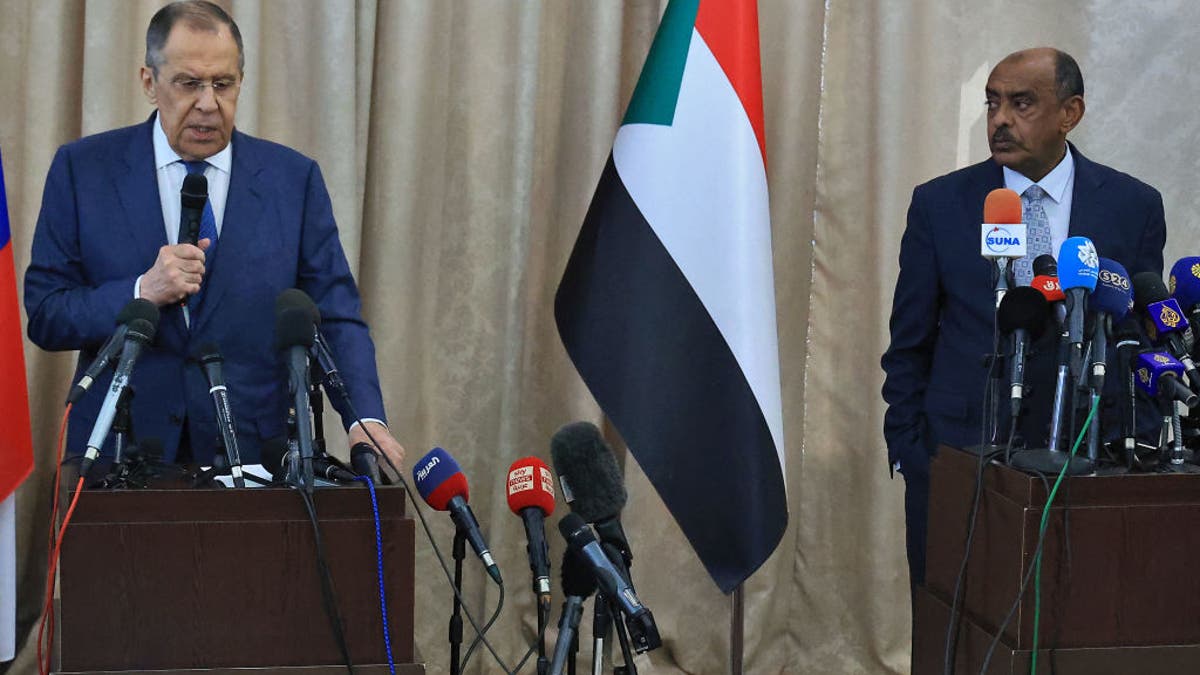
Russian Foreign Minister Sergei Lavrov, left, and Sudanese acting foreign minister Ali al-Sadiq give a joint press conference at the airport in Khartoum on Feb. 9, 2023 during an official visit to Sudan. (Photo by ASHRAF SHAZLY/AFP via Getty Images)
Atta-Asamoah noted, "Unless the situation is resolved quickly, the two leaders will attempt to draw on various political cards to support their fight against each other. Currently, given the extent to which both sides are armed, the fighting has the potential to escalate into a full-blown civil war which will suck in various factions and armed groups across the country."
He even believes the superpowers could get sucked further into what is essentially a local conflict.
"If the situation deteriorates and the battle lines continue to entrench, however, global powers might be forced to take sides," he said." Such an occurrence will create a proxy conflict that will last for a long time and destroy the Sudanese state."
THE Associated Press contributed to this report.

